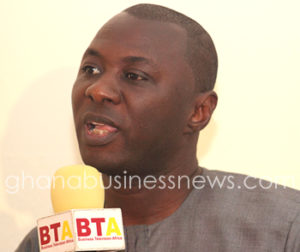Electricity tariffs will continue to be high in Ghana unless… – Dr. Anta
 Electricity tariffs in Ghana will continue to be high as long as the country continues to procure more expensive power, Dr. Amin Adam Anta, the Executive Director of the African Centre for Energy Policy (ACEP), has said.
Electricity tariffs in Ghana will continue to be high as long as the country continues to procure more expensive power, Dr. Amin Adam Anta, the Executive Director of the African Centre for Energy Policy (ACEP), has said.
Speaking at a Business Summit organized by Business Television Africa, in Accra, he argued that Ghana can only sell power cheap through competitive bidding in the procurement of power as Ethiopia does.
He urged that the situation shouldn’t continue, adding that, “we can make power cheap.”
Acccording to him, Ethiopia in recent times has embarked on open and competitive bidding processes for power purchase, as opposed to direct negotiations.
Dr. Anta pointed out that in the case of Ghana, the direct negotiations are mostly unsolicited proposals coming from people who are politically connected.
That happens, he said “to the extent that there is no criteria and standard to evaluate which power we can procure and which we don’t, so we can make power cheaper than it is today.
If we have gone for emergency power on competitive and open bidding terms, we could have had power far cheaper than we have got. So power can be cheap.”
He noted that in the medium term, Ghana may be able to produce its power needs in terms of its installed capacity.
“Demand is currently at 2100MW, and installed capacity is 3800MW, and looking at that, we shouldn’t be having the current situation,” he said, adding that, “generation addition is important but not the solution. Firstly we must check the financial crisis in the sector. We must improve the liquidity of the public companies.”
Dr. Anta said the Asogli plant feeds on VRA to survive, but the Asogli plant is doubling its capacity in three years, while it is taking VRA some nine years to complete a 220 MW thermal plant.
The reason for that situation, he said is because, Asogli has a power purchase agreement with ECG in dollar denominated terms and the government has provided a consent agreement, something like a guarantee, when ECG fails to pay, the government would come in.
“But we don’t have the same terms and conditions with VRA. Where a private company has all the benefits and guarantees, VRA has no power purchase agreement with the ECG. And so when it comes to ECG paying its contractors, they will look first at those they have a contract with, before they look at VRA. And so in terms of cash flow, in terms of liquidity, Asogli is better placed, and that’s why Asogli is succeeding and VRA is not. The political economic is just not right,” he said.
Dr. Anta urged the country to look for solutions to the energy crisis, arguing further that even though Ghana is a middle income country, the country is yet to produce enough power to meet its needs.
“When you talk about availability and usage it is even worse. Out of 3800MW of installed power only about 200MW is available, and that gives a per capita usage of 109kw, less than 252kwh as in Ivory Coast. And if VALCO was in operation, the kilowatt per hour usage would have gone lower,” he said.
He indicated that Ghana still has power generation challenges.
“We have seen different options. Emergency power plant of 870MW costing us $2 billion. Thermal generation, the new ones, Kpong Asogli phase two, SEND power, Amandi all costing about $2.5 billion. Co-generation is being planned by VRA for 700MW and that would cost $1.5 billion. In power generation alone we are talking about $5 to $6 billion – where is the money?” He asked.
“That is why some people think high tariffs have come to stay because we are procuring more expensive power, and when you procure expensive power, the tariff would reflect it,” he added.
By Emmanuel K. Dogbevi
Copyright © 2016 by Creative Imaginations Publicity
All rights reserved. This news item or any portion thereof may not be reproduced or used in any manner whatsoever without the express written permission of the publisher except for the use of brief quotations in reviews.

Dr. Anta’s article is well researched. Is anyone listening?